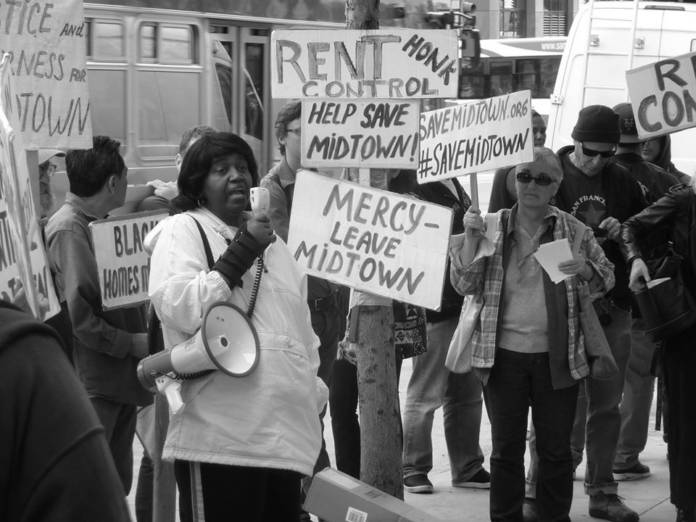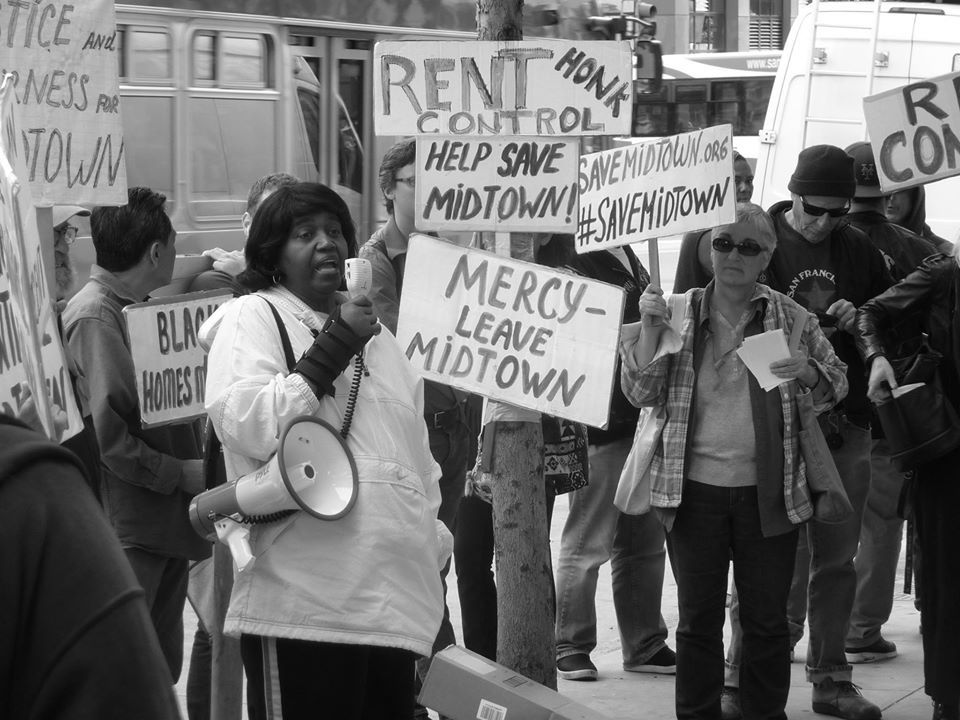
Supervisor Dean Preston announced Tuesday the introduction of legislation that would bring the Fillmore-Western Addition’s historic Midtown Park Apartments under rent control.
The rents at the Midtown Park Apartments had been restricted since 1979, the year that San Francisco’s rent control law took effect. But in 2013, the city awarded the management and development contracts for the city-owned property to affordable housing developer Mercy Housing, which announced it would not respect the old rules.

At the time of the property’s transfer to Mercy Housing, the city ruled that Midtown was not subject to rent control despite the more than 30-year precedent, saying that rent control does not apply to city-owned properties. That element of the law in effect functions as a loophole; Midtown is the only city-owned property that is not public housing, and therefore the only example to which to this rule could possibly apply. The Rent Board’s ruling was later upheld by the Superior Court.
After the ruling, Mercy Housing moved to implement its “Rent Modification Income Certification Program,” a new scheme that tied rent to the income and assets of residents. Initially, Mercy Housing claimed that most residents experienced rent decreases from the reassessment, but it was later discovered that a majority of residents saw their rent increase by between 30 and 300 percent.
Midtown tenants responded to the rent increases by launching a partial rent strike, refusing to pay the increases beyond their original, rent-controlled rent—the rent that they believed to be fair. Even residents whose rents went up only a few dollars per month joined the strike in solidarity with other residents. “Even if it doesn’t affect me, it affects my neighbor,” said Midtown resident Donald Griggs. The Midtown rent strike remains San Francisco’s longest-running rent strike in city history, surpassing the Ping Yuen strike of 1978 in Chinatown.
In an earlier victory for Midtown tenants, Mercy Housing announced late last year that it would be stepping down as developer and property manager of the historically tenant self-managed apartments.
Now tenants can potentially end their five-year strike, under the best possible circumstances: District 5’s new supervisor is introducing legislation to restore rent control to the complex. It is a move that will allow residents the stability to pursue their long-term goals of cooperative ownership and self-management without the looming threat of eviction or displacement.
Preston has been supporting Midtown tenants in his capacity as a tenant lawyer since 2016, when he authored “Rent Control for Midtown”, an outline of his proposal to restore rent protections to the complex.
At Tuesday’s board meeting, Preston announced his proposed legislation, saying, “For years the tenants at Midtown believed they were covered by the city’s rent control law and they were treated as such…There are many issues to be resolved at Midtown, including working out a longer-term plan regarding the ownership and operation of Midtown…”
He went to say, “Thanks to organizing by the Midtown Tenant’s Association and allies, the city’s original plan to demolish Midtown is off the table. I look forward to working with all stakeholders to arrive at a long-term plan that is supported by the residents. But in the meantime, it is simply unacceptable for any residents of Midtown to be asked to pay rent increases in publically owned housing higher than rent increases they would have faced if they lived across the street in privately owned housing. Midtown tenants deserve rent-control protections.”
Over the past ten years, more than 4,000 rent-controlled units have been lost in San Francisco. These losses have typically coincided with a tenant eviction. Preston’s legislation for Midtown presents a rare opportunity to reverse this city-wide trend.
If Preston’s proposed legislation is passed, and the mayor signs it into law, the 139 units at Midtown will again be a part of San Francisco’s remaining rent control housing stock.


